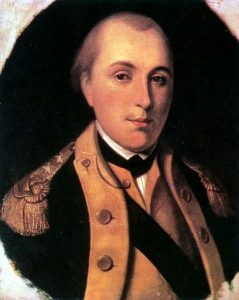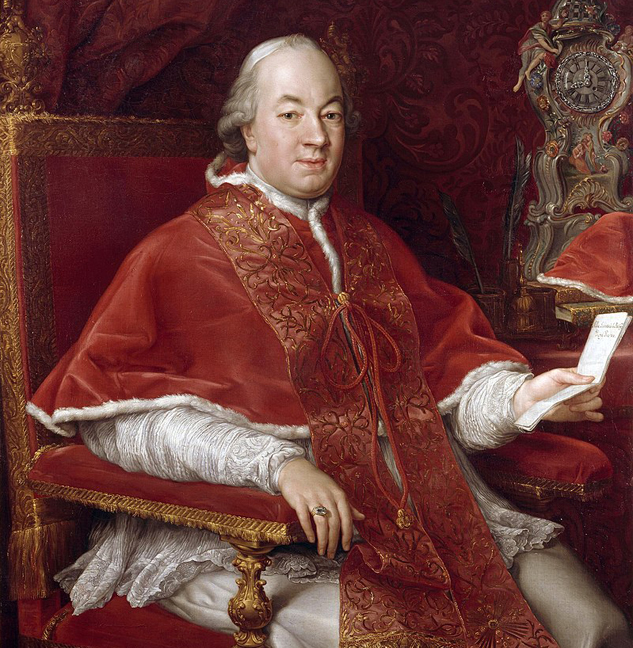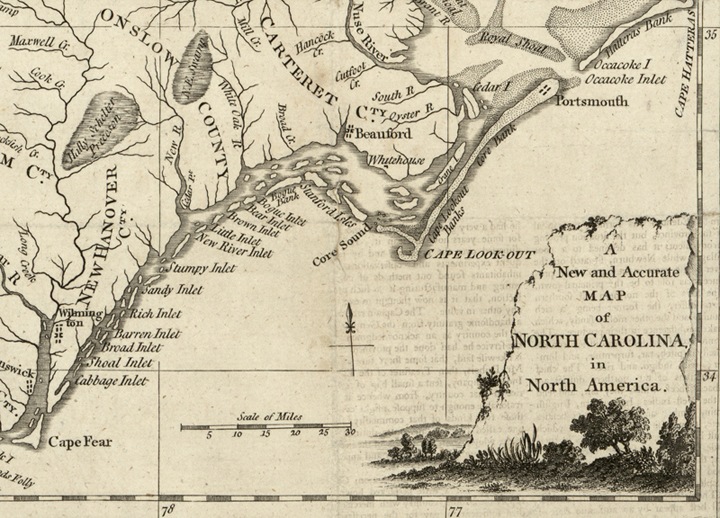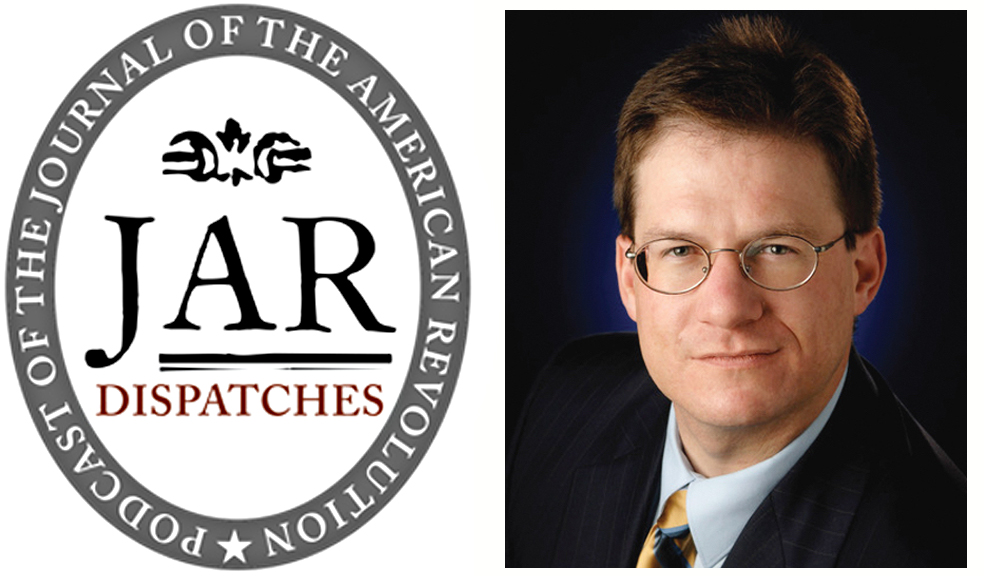An important facet of Washington’s generalship has gone largely unexplored by historians: his role as a diplomat. For a top-level military leader in a coalition, maintaining good relations with allies is of the first importance. With the signing of the military alliance with France in 1778, Washington had to add this role to his generalship. As soon as French vice admiral d’Estaing arrived with his naval squadron on the American coast to cooperate with Washington’s army, the American commander in chief had to become a diplomat. The American general had to cultivate harmonious relations with his French counterpart as well as with the French ministers plenipotentiary, who often visited his headquarters to discuss strategy.
During the Rhode Island campaign of 1778, Washington’s diplomacy saved the fledgling Franco-American alliance. Shortly after d’Estaing’s arrival in early July, the two commanders decided to make the capture of Newport, Rhode Island the allies’ first objective. Early on, Washington recognized the importance of accord between the allied forces. “Harmony & the best understanding between us, should be a Capital & first Object,” he reminded Maj. Gen. John Sullivan, the commander of the American troops in the state of Rhode Island.[1] Sullivan and d’Estaing planned to land their respective forces on Aquidneck Island and in a joint offensive drive the British from Newport. But after a promising start to the campaign, d’Estaing, with several ships damaged in a storm and facing the threat of a superior British fleet, chose to sail his squadron to Boston where he could safely repair and refit his ships. Reacting angrily to the Frenchman’s strategic decision, Sullivan’s general officers issued a “Protest” that declared “the Honor of the French Nation … injured by their Fleet abandoning their Allies.” Sullivan followed this protest by writing a letter to the general officers in which he accused d’Estaing of “having abandoned us.” The next day he issued a general order in which he accused the French of failing the “great dependance” the Americans had placed on their assistance. As might be expected, the allied commanders-in-chief did not react well to these rash pronouncements. Washington thought Sullivan’s order had been “very impolitic.” The French admiral was “much displeas’d” and “much wounded” by the protest.[2]
In this potentially damaging situation, Washington’s overarching concern became protection of the French alliance. He could not allow public censure of the French that would hazard the partnership, and he so instructed Sullivan and Maj. Gen. William Heath at Boston. According to Washington, “at so critical a moment” the situation had to be “prudently managed” to avoid “injurious consequences” to the alliance.[3] The American commander then took a personal hand in resolving the crisis. He called on his generals to protect the military partnership with France. Washington urged Heath to use his “utmost influence to palliate and soften matters.” To Sullivan, Washington revealed his deep concern for the preservation of the coalition. The disagreement had given him a “very singular uneasiness.” “The Continent at large is concerned in our cordiality,” he wrote, “and it should be kept up by all possible means that are consistent with our honor and policy. … Permit me to recommend in the most particular manner, the cultivation of harmony and good agreement.”
Letting his generals conduct the local diplomacy, Washington took a statesmanlike approach to d’Estaing’s withdrawal. He ignored the controversy and focused on his chief concern: keeping the French fleet in American waters. He wrote the French admiral: “The importance of the fleet under your command to the common cause and the interest I take in your personal concerns would not permit me, but to be deeply affected with the information of the disappointment and injuries you sustained in the late unfortunate storm. I flatter myself, and I most ardently hope, my countrymen will exert themselves to give you every aid in their power, that you may as soon as possible recover from the damage you have suffered and be in a condition to renew your efforts against the common enemy.” D’Estaing’s final words on the incident reveal the effectiveness of the general’s diplomatic policy. The French commander told Washington that he remained “devoted to the common cause, and the union of the two nations,” and he graciously credited the general’s letters with smoothing over the crisis, assuring the American commander that Sullivan’s words were “intirely forgotten.”[4]

In addition to averting a dangerous breach with d’Estaing, Washington extended his diplomacy to relations with the Marquis de Lafayette. Although historians have generally recognized the father-son aspect of the general’s relationship with Lafayette, they have failed to recognize the alliance diplomacy involved in their association. Washington held Lafayette in highest esteem of all the foreign officers in the army.[5] Not only was the young and sensitive marquis a major general in the Continental army, he was its highest-ranking French officer and a nobleman who could be influential at the French Court. Realizing Lafayette’s importance to the alliance, the American commander had to treat him with careful consideration.
During the Newport crisis, Washington believed pacifying Lafayette most crucial as the other French officers looked up to him as their head. He also realized Lafayette’s influence with d’Estaing and the French commanders.[6] In two letters to the young French general Washington praised him and appealed to him for help in holding the coalition together. After assuring Lafayette that he felt for him and “for our good & great Allys the French,” the American commander characterized the protests of Sullivan and his generals as “illiberal” and “unthinking.” Washington applauded Lafayette as the patron of the army’s French officers, reminded him of the importance of his leadership to the alliance, and appealed to him to offer a “healing hand” to a wound “unintentionally” made. He had no doubt that the Frenchman would use his “utmost endeavours to restore harmony” so that the alliance would be “promoted and cemented in the firmest manner.”[7] In a second letter, Washington expressed his friendship and praised Lafayette’s assistance to the Revolution, speaking of his “love of liberty” and his “noble, & disinterested exertions in the cause of [liberty].” He extolled Lafayette’s “ardent Zeal” in the campaign and offered his “warmest thanks” for the Frenchman’s “endeavours to cherish harmony.”[8] When Lafayette decided to return to France in late 1778, Washington wrote an effusive letter of recommendation for him to present to Benjamin Franklin, the American minister in Paris, in which he praised the French general’s “Zeal, Military ardour & talents.” He hoped the letter would give Franklin “an idea of the value this country sets upon you.”[9] Washington’s diplomacy bore valuable fruit. Lafayette praised Washington and his army at the French court, and his efforts were instrumental in France’s sending Lieutenant General Rochambeau’s expeditionary army to America in 1780.[10]
Though the Continental Congress was primarily responsible for diplomatic relations with the French, Washington played an important part in maintaining good relations with their ambassadors. The general proved just as skilled at dealing with these officials as he had with d’Estaing and Lafayette. When the King of France sent a new minister plenipotentiary, the Chevalier de La Luzerne, to America to replace Conrad Alexandre Gérard, Washington had to once again become a diplomat
During La Luzerne’s three-day visit to West Point in September 1779, the general deployed all his diplomatic skill. La Luzerne’s secretary, the Marquis de Barbé-Marbois, described their meeting with the American commander and their boat trip downriver to the fortress: “In spite of all the objections of M. de la Luzerne, General Washington came to meet him at Fishkill. He received us with a noble, modest, and gentle urbanity and with that graciousness which seems to be the basis of his character. . .. We embarked with the General on … the Hudson, and sailed down it with the tide to West Point where the headquarters are, surrounded by the chief posts of the American army. The general held the tiller, and during a little squall which required skill and practice, proved to us that this work was no less known to him than are other bits of useful knowledge.” The dinner that Washington served the Frenchmen became part of his diplomacy. “All the generals and the higher officers were there,” Barbé-Marbois wrote. “It was interesting to see this meeting of these warriors, each of them a patriot renowned for some exploit, and this military meal, served in a tent in the midst of the apparatus of arms, in the heart of the former possessions of our enemies, to a French minister and officers, was to all of us a remarkable novelty. [The general] spoke of the fine behavior of my compatriots and of the glory which they had won in America. … A few steps away from us musicians played military and tuneful French airs. The banks and the forests of the mountain answered long to the cannon shots fired to the health of the King and Queen ….”
The next day Washington, who, Barbé-Marbois noted, “wanted to conduct us himself,” led La Luzerne on an inspection tour of West Point’s newly expanded and strengthened fortifications, and the party observed the maneuvers of the army’s brigades with Barbé-Marbois commenting on the Continentals: “They had hardly any clothes, but were very well armed, and the men were strong and robust.” That afternoon at four o’clock the party dined at the quarters of Brigadier General Duportail, Frenchman and chief of the American army’s Corps of Engineers. Following the dinner, Washington held a strategic planning conference with La Luzerne. At the conclusion of La Luzerne’s visit Washington and “the chief officers of his army” escorted him away from West Point and the American commander in chief had two of his generals continue the escort across New York and New Jersey. Showing the effectiveness of Washington’s diplomacy, Barbé-Marbois, who himself later became French minister to the United States, commented, “I shall always recall with pleasure the time which I spent with that man who is so much to be respected.”[11]
Washington excelled at this aspect of coalition leadership. No American general would have to act as a diplomat in such circumstances as this until Dwight D. Eisenhower in World War II. By the end of the war, Washington would be expert in diplomacy, but even in the first two years of the alliance he demonstrated a talent for this new and difficult task.
[1] Washington to John Sullivan, July 27, 1778, in Papers of George Washington, Revolutionary War series (PGWRW), 16:187-88.
[2] Sullivan to Washington, August 23, 1778, n.1, PGWRW, 16: 360-61; Lafayette to Washington, August 25-26, 1778, n.4, PGWRW, 16:374; Washington to Nathanael Greene, September 1, 1778, PGWRW, 16:458-59; Washington to Lafayette, September 1, 1778 (second letter), PGWRW, 16:461-64; and John Laurens to Washington, September 2, 1778, PGWRW 16:479-80.
[3] Washington to William Heath, August 28, 1778, and Washington to Sullivan, August 28, 1778, PGWRW, 16:401-2, 406-7
[4] Washington to d’Estaing, September 2, 1778, PGWRW, 16: 468-70; d’Estaing to Washington, September 5, 1778, PGWRW, 16:522-25; d’Estaing to Washington, September 17, 1778, PGWRW, 17:33-37.
[5] Washington to Gouverneur Morris, July 24, 1778, PGWRW, 16:153-55.
[6] Washington to Nathanael Greene, September 1, 1778, PGWRW, 16:458-59. For Lafayette’s influence with d’Estaing, see Lafayette to Washington, August 6, 1778, PGWRW, 16: 261-62, Lafayette to Washington, September 21, 1778, PGWRW, 17:69-72. For his influence with the French court, see Greene to Washington, September 16, 1778, PGWRW, 17:22-25.
[7] Washington to Lafayette, September 1, 1778 (first letter), PGWRW, 16:460-61.
[8] Washington to Lafayette, September 25, 1778, PGWRW, 17:128-32.
[9] Washington to Benjamin Franklin, December 28, 1778, and Washington to Lafayette, December 29, 1778, PGWRW, 18:521-22, 526-27
[10] See James Lovell to Washington, August 25, 1779, PGWRW, 22:254-56; and Arnold Whitridge, Rochambeau (New York, 1965), 72-73. Lafayette had decided to return to France to take part in any French offensive against Great Britain. After a French cross-channel invasion proved abortive, he returned to America in May 1780.
[11] Substance of a Conference with La Luzerne, September 16, 1779, source note, PGWRW, 22: 442-44.










One thought on “General George Washington: Diplomat”
It is well that Mssr. Washington learned much from his first failed diplomatic mission to French officers; and equally remarkable that the French officers of the revolutionary period so amiably chose to have forgotten that first mission. Diplomacy is truly a two way street.